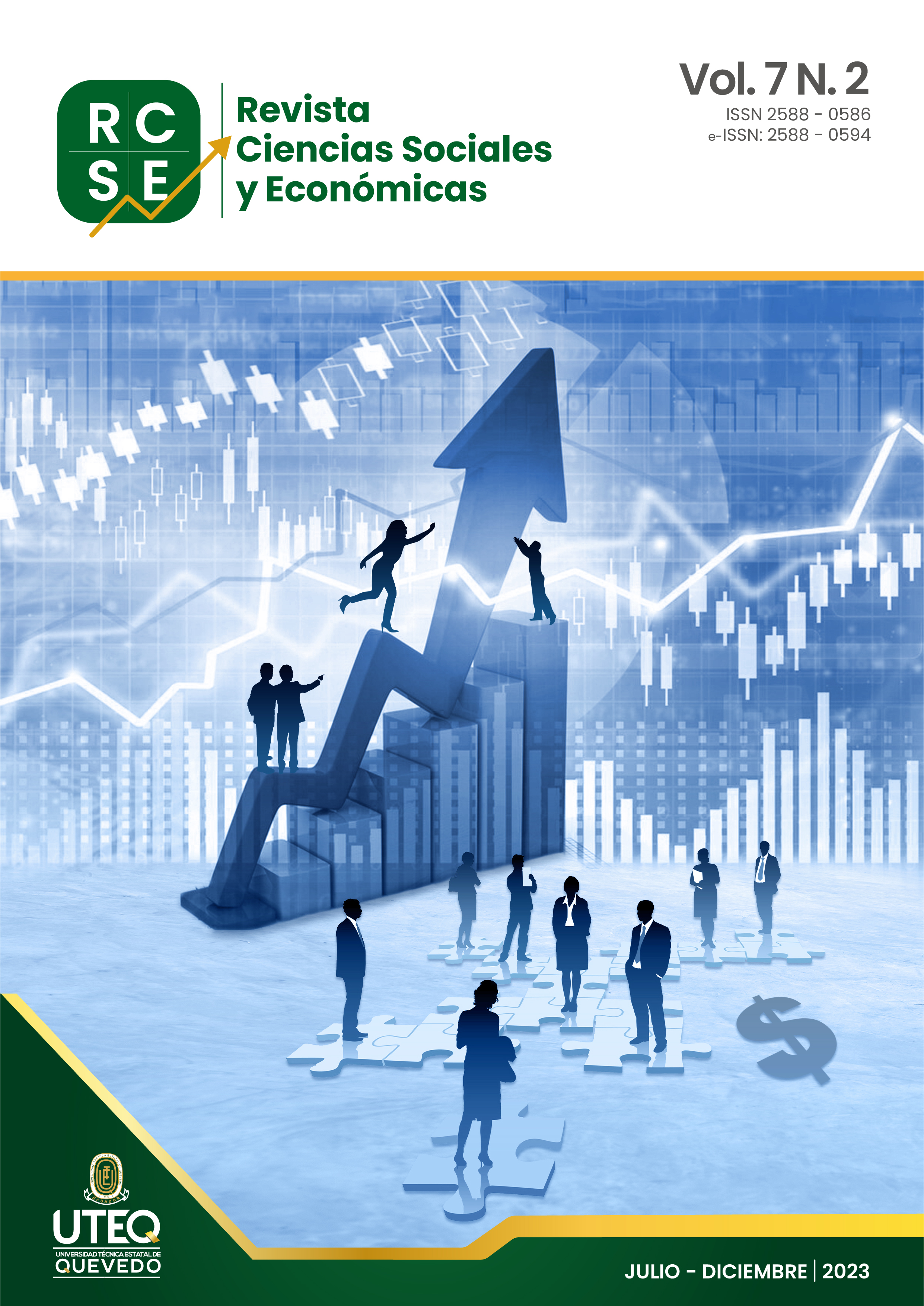Training plan for entrepreneurs: imperative to strengthen microenterprises
DOI:
https://doi.org/10.18779/csye.v7i2.655Keywords:
business, administration and economy, entrepreneurship, training, management of productive organizationsAbstract
The article presented responds to the objective of designing a training plan for entrepreneurs in the social sectors of the canton of La Maná, Cotopaxi, based on the identification of the main insufficiencies that exist in this regard and, from this, contribute to the creation of new economic models that have an impact on the consolidation of the democratic state, the solidarity and sustainable economic system that strengthens citizenship, to help promote the transformation of the productive matrix, the solidarity economy and sustainable development. A qualitative-quantitative study of a descriptive nature was carried out, through observation, surveys, interviews and review of economic records. Likewise, the search and analysis of specialized literature was carried out to compare the real and the desired state; On this basis, through theoretical modeling, the training plan is designed, in interrelation with the analytical-synthetic and inductivedeductive methods. In general, it is considered that the training plan aimed at entrepreneurs from the social sectors of the La Maná canton enables the success of a microenterprise with committed employees, through
a series of activities that ensure competitiveness, reducing training costs, opportunity costs and costs of dissatisfied customers due to incorrect execution of the company’s processes.
Downloads
References
Beras,D. (2019). Dificultades de emprender en Ecuador. https://emprender.ec/dificultades-de-emprender-en-ecuador/
Briasco, I. (2016). El desafío de emprender en el siglo XXI: Herramientas para desarrollar la competencia emprendedora. In Narcea S.A. https://books.google.es/
Cobo, E. (2023). La formación para el emprendimiento de los estudiantes de la carrera Gestión Empresarial de la Universidad Técnica Estatal de Quevedo, Ecuador. [Tesis Doctoral]. Universidad de Granma. Manzanillo. Cuba.
Global Entrepreneurship Monitor Ecuador (2020). www.espae.edu.cu
Gonzaga, S., Alaña, T. y González, A. (2017). Competitividad y Emprendimiento: Herramientas de Crecimiento Económico de un país. INNOVA ResearchJournal, 2(8.1). https://doi.org/10.33890/innova.v2.n8.1.2017.386
González, G., Becerril, M. y Fonseca, A. (2018). El engagement como factor de formación y desarrollo de la cultura emprendedora en estudiantes universitarios. IE Revista de Investigación Educativa de La REDIECH, 9(17) 103-118. https://doi.org/10.33010/ie rie rediech.v9i17.120
González, K. (2020). ¿Qué lleva a cerrar un emprendimiento en Ecuador y cómo evitar que pase? Expreso-economía: https://www.expreso.ec/actualidad/economia/gem-emprendimiento-ecuador- reporte-cerrar-economia-negocios-duracion-87071.html
González-Tejerina, S. y Vieira, M. (2021). La formación en emprendimiento en Educación Primaria y Secundaria: una revisión sistemática. Revista Complutense de Educación, 32(1), 99–111. https://doi.org/10.5209/RCED.68073
Grotz, S. (2019). Cómo transformar un sueño en un proyecto. Cuadernos del Centro de Estudios de Diseño y Comunicación, 57, 125–135. https://doi.org/10.18682/cdc.vi57.1460
Guachimbosa, V., Lavín, J. y Santiago, N. (2019). Universidad para el emprendimiento. Perfil formativo profesional y vocación de crear empresas. Universidad Técnica de Ambato, Ecuador. Revista Venezolana de Gerencia, 24(85). https://www.redalyc.org/articulo.oa?
Guerrero, C. y Villamar, A. (2019). La interdisciplinariedad como eje transversal en la enseñanza de la asignatura de Emprendimiento y Gestión. Espíritu Emprendedor TES, 3(1). https://doi.org/10.33970/eetes.v3.n1.2019.115
Giurfa, Á. (2012). Estudio de desarrollo emprendedor de la población joven en la Provincia de -Angelo Fernando. Universidad Privada de Tacna. https://books.google.com.ec/books?id=DK7vswEACAAJ&dq=I+estudio+de+desarrollo+emprendedor+ de+la+población+joven&hl=es&sa=X&redir_esc=y
Ortogorin Ludeña, E. (2018). El emprendimiento y su relación con la formación profesional de los estudiantes de la Facultad de Agropecuaria y Nutrición de la Universidad Nacional de Educación Enrique Guzmán y Valle. [Tesis de Maestría, Universidad Nacional de Educación Enrique Guzmán y Valle] Repositorio Institucional Digital – UNE. http://repositorio.une.edu.pe/handle/UNE/1982
Han, E., Goleman, D., Boyatzis, R. y Mckee, A. (2019). Marketing para emprendedores. Journal of Chemical Information and Modeling, 53(9).
Hernando, C. (2013). Simulación Empresarial, Mc.GrawHill, Madrid.
Índice Global de Innovación- Iberglobal (2019). www. iberglobal .com –index-php.
Jiménez, M., y Balseca, S. (2020). Perfil de los emprendedores de la ciudad de Latacunga, provincia de Cotopaxi, Ecuador, al año 2019. UTC Prospectivas-Revista de Ciencias Administrativas y Económicas, 17.
Salinas,J., Gándara, J., Alonso, A. y Santamaría, U. (2013). Empresa e inciativa emprendedora. McGraw-Hill/Interamericana de España. https://books.google.com/books/about/Empresa_e_iniciativa_emprendedora.html?hl=es&id=RdnBuAAACAAJ
Vizueta, V. (2020). Los factores que afectan a los emprendimientos en el Ecuador. INNOVA Research Journal 5 (3.2), 122-133.
Published
How to Cite
Issue
Section
License
Copyright (c) 2023 Eduardo Fabricio Cabrera Toscano, Mayra Elizabeth Valencia Neto, Enry Gutember Medina López

This work is licensed under a Creative Commons Attribution-NonCommercial-ShareAlike 4.0 International License.
Licensing Agreement
This journal provides free access to its content through its website following the principle that making research available free of charge to the public supports a larger exchange of global knowledge.
Web content of the journal is distributed under a Attribution-NonCommercial-ShareAlike 4.0 International.
Authors may adopt other non-exclusive license agreements for the distribution of the version of the published work, provided that the initial publication in this journal is indicated. Authors are allowed and recommended to disseminate their work through the internet before and during the submission process, which can produce interesting exchanges and increase citations of the published work.






